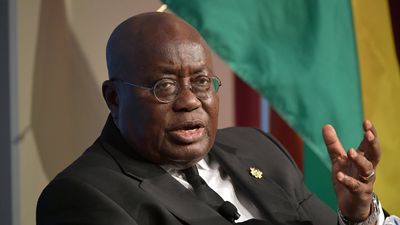Why Ghana’s President is Delaying Decision on Anti-LGBTQ Bill
The passing of the controversial Bill, which imposes prison sentences of up to three years for LGBTQ+ people, and up to five years for forming or funding pro LGBTQ+ groups, is being challenged in the West African country’s Supreme Court.
Update: This story has been updated to reflect the most current information as of Tuesday, March 5 at 7:00 p.m. GMT.
President Nana Akufo-Addo of Ghana has said that he will wait on the outcome of a case at the country’s Supreme Court before making a decision on the anti-LGBTQ legislation passed by the West African country’s parliament last Wednesday.
The president had previously stated that he’ll sign the bill into law if the majority of Ghanaians want him to. But with the case at the apex court, Akufo-Addo believes, “It would be as well for all of us to hold our hands and await the decision of the Court before any action is taken.”
According to the BBC, lawyer and journalist Richard Dela Sky, who is challenging the passing of the bill in court, says there were not enough legislators in session when it was passed. It is unclear how many legislators were in the chamber when the bill was passed, but according to the Ghanaian constitution, at least half of the 275 elected members of parliament must take part in the vote to pass a bill.
In a document seen by the BBC, Ghana’s finance ministry, urging the president not to sign the Bill, warned that the country might lose up to $3.8 billion in funding from the World Bank in five to six years if the bill becomes law.
It is believed that the Supreme Court case might extend beyond Akufo-Addo’s term in office which ends January 2025.
The Ghanaian parliament passed the bill last Wednesday, criminalizing those who identify as LGBTQ+ in the country. The “Human Sexual Rights and Family Values Bill 2021,” passed through the third reading, bringing it closer to being signed into law. The bill prescribes a three-year sentence for anyone convicted of identifying as queer. Organizations or individuals found forming or funding LGBTQ+ groups are set to face a maximum of five-year prison sentences if found guilty as well.
The bill had even been scaled down from its original form, after public pressure. The first iteration recommended longer jail terms and included a conversion therapy clause. Gay sex already carries a three-year prison sentence in Ghana. This bill sets out to expand the scope of this criminalization.
A Long Fight
The bill has been under consideration since 2021, and became a topic of conversation shortly after the police raided an LGBTQ+ resource center in May 2021. Twenty-one people who were there attending a paralegal training workshop were arrested and detained for twenty-two days and eventually charged with unlawful assembly. Despite the efforts by human rights activists and activist groups, the Ghanaian parliament remained mostly in support of its decision. In July 2023, the Supreme Court kicked out a case that challenged the bill. The case, brought to court by academic researcher Dr. Amanda Odoi, alleged that the members of parliament had failed to assess the economic impact if the bill passed into law. The court’s decision to dismiss the case was unanimous, stating that Dr. Odoi’s case wasn’t convincing enough to stop the passage of the Bill from moving forward.
“Shattered and Devastated”
In response to the news, human rights organizations and activists in Ghana have been expressing the parliament’s decision as catastrophic. Phyll Opoku-Gyimah, a British Ghanaian Human Rights activist, expressed devastation at the recent development, saying that the bill will set dangerous precedents for the well-being of LGBTQ+ people in Ghana.
“It will undoubtedly lead to increased discrimination, violence, and marginalization of LGBTQ+ individuals, further exacerbating their struggles for acceptance and equality. It is important to advocate for the rights and safety of all individuals, regardless of their sexual orientation or gender identity or expression,” she wrote on X (formerly Twitter).
In a statement reacting to the news, Executive Director of UNAIDS, Winnie Byanyima, said that if the bill becomes law, “it will exacerbate fear and hatred, could incite violence against fellow Ghanaian citizens, and will negatively impact on free speech, freedom of movement and freedom of association,” adding that it will also, “obstruct access to life-saving services, undercut social protection, and jeopardize Ghana’s development success.”
Amnesty International had warned that the situation in Ghana could, “become even more precarious for LGBTI persons if the Ghanaian Parliament proceeds with one of the most stringent anti-LGBTI rights bills on the continent.”
At this time, all eyes are on President Akufo-Addo who will decide if the bill will be passed into law or not. In 2021, the President said he had no intentions of making same-sex marriage legal under his administration, and he has also mentioned he would side with the majority in his decision to sign the latest anti-LGBTQ+ bill into law.
- Ghana's Supreme Court Dismisses Challenge to Anti-LGBT Bill, Paving the Way for Ratification ›
- Ghana Lawmakers Push for Furthering Anti-LGBTQ Legislation ›
- Ghana's Anti-Gay Bill and What It Means For the Nation ›
- As the 2024 Ghana Elections Draw Near, Voters Express Uncertainty About the Major Candidates - Okayplayer ›
- In Ghana, Voters Feel They Choose Between the Lesser of Two Evils - Okayplayer ›
- Ghana Elects First Female Vice President as Opposition Wins Election | OkayAfrica ›
- Op-ed: Ghana’s Former President Leaves Office With A Contentious Legacy | OkayAfrica ›
